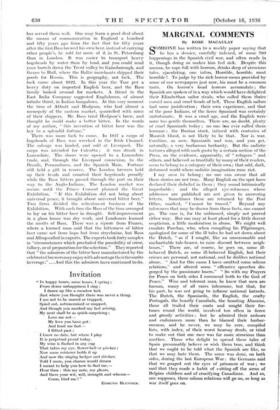MARGINAL COMMENTS
By ROSE MACAULAY
SOMEONE has written to a weekly paper -saying that he has a dossier, carefully indexed, of some 700 happenings in the Spanish civil war, and often reads in , it, though doing so makes him feel sick. Despite this nausea, he sups full with horrors, drinks deep of atrocious tales,. ejaculating, one infers, Horrible, horrible, most horrible ! To judge by the rich horror-menu provided by - some of our newspapers just now; his must be a common taste. -On horror's head horrors accumulate ; the Spanish are spoken of in a Way which Would have delighted their :Elizabethan sailor rivals, who called them thrice cursed men and cruel fiends of hell.- These English sailors had some justification; their own eiverienee, and that of the poor Indians; of the fierce Spaniard wa certainly unfortunate. It was a cruel age, and the English Were : none too. gentle themselves. There-are, no doubt, plenty: of cruel Spaniards today ; no one has ever called them humane ; . the Iberian stock, 'infused: with, centuries:of Moorish blood, is not likely to be that. Nor is war. Combine, as now, Spaniards and war, and you get, naturally; a very barbarous barbarity. But the sadistic tortures alleged with such gusto by a certain section of the Press, on the evidence, apparently, of " refugees " and others; and believed so trustfully. by many of their readers,. seem to belong to a category of their own; that odd, dark, deformed world where sadistic imagination runs riot.
I say seem to belong ; no one can swear that all these. stories are not true. Many English on the spot have r declared their disbelief in them ; they sound intrinsically improbable ; and the alleged eye-witnesses whose addresses are published are not given to answering letters. Sometimes these are returned by the Post Office, marked, "Cannot be traced." Beyond any inferences that may be drawn from these facts, one cannot go. The case is, for the unbiassed, simply not proved either way. But one may at least plead for a little decent scepticism, a little moderation in abuse. We might well emulate Purchas, who, when compiling his Pilgrimages, apologised for sonic of the ill tales he had set down about - the Dutch, "as if I sought, like an unseasonable and uncharitable, tale-bearer, to raise discord between neigh- • hours." There are, of course, he goes on, some ill- • behaved Dutch, as some ill-behaved English, but their crimes are personal, not national, and he dislikes national - abuse. "And for this cause I have omitted some odious relations," and altered some "offensive speeches dis- gorged by the .passionate losers." "So with _my Prayers for Peace on both sides I commend both to the God of Peace." Wise and tolerant man, he knew that men are human, many of all races inhumane, but that, for his part, he was not going to inflame national hatreds.. The Dutch, the Spaniards, the English,. the crafty Portugals, the beastly _Cannibals, the boasting Abassins, these all trailed their coats and 'sought' their for- tunes round the world, involved too often in fierce and greedy activities ; but he admired their ardours and endurances. more than he blamed their barbar- ousness, and he . never, we may be sure, compiled lists, with index, of their worst hearsay deeds, or tried to make out that one race was far more atrocious than another. Those who delight to spread these tales of: Spain presumably believe or wish them true, and think that we ought to be told what the Spanish are like, so that we may hate them. The same was done, on both sides, during the last European War : the Germans gaid that we gouged out the eyes of prisoners of war ; we said that they made a habit of cutting off the arms of Belgian children and of crucifying Canadians. And so, - one supposes, these odious relations will go on, so long as war itself goes on.




















































 Previous page
Previous page